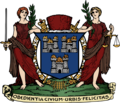| Occupy Dame Street | |
|---|---|
| Part of the Occupy movement and anti-austerity protests in Ireland | |
 The entrance to Occupy Dame Street's "Tent Town" on 19 December 2011 | |
| Date | From 8 October 2011 to 8 March 2012 |
| Location | |
| Caused by | Economic inequality, corporate influence over government, Populism, inter alia. |
| Methods | |
| Number | |
| 2,000+ | |
Occupy Dame Street (ODS) or Occupy Dublin was a peaceful protest [1] and demonstration against economic inequality, social injustice and corporate greed taking place outside the Central Bank of Ireland plaza on Dame Street in Dublin, beside the Temple Bar area of the city. Part of the global Occupy movement, it took its name from the Occupy Wall Street demonstration in New York City's Wall Street financial district. Occupy Dame Street had four requests: the withdrawal of the EU/IMF from Ireland, an end to public ownership of private debt, the return to public ownership of Ireland's privatised oil and gas reserves, and the implementation of what the movement describes as "real participatory democracy". [2] The national police force, Garda Síochána, dismantled their camp during a late-night raid on 8 March 2012. The protesters vowed to fight on. [3] Some were never heard of again, while others found other channels of protest. The most detailed account and analysis of events was written by Helena Sheehan. [4]


